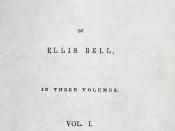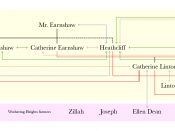WUTHERING HEIGHTS
Emily Brontë, 1847
1)
The story takes place in the early XIXth century. There are two characters in this extract : Mr Lockwood and Catherine Linton. Mr Lockwood is the first narrator of this novel, he was one of Mr Heathcliff's tenants. At the beginning of the story , there were three characters : Heathcliff, a foundling, his sister Catherine and his brother Hindley. Catherine fell in love with Heathcliff, but was married with Edgar Linton. So, the second character we meet here is Catherine Linton, Edgar Linton's daughter. This extract belongs to the end of the novel. Catherine comes back to the farm Wuthering Heights, she tries to get in the house trough the window. Mr Lockwood, which had read Catherine's diary, does not recognize her.
2)
In this text, Mr Lockwood is in his bed room at Wuthering Heights, he is alone and he had to stay in the farm because of the snow.
He is disturbed by the gusty wind and the incessant move of the fir-bough. So he tries to stop this teasing noise, opening the window and seizing the branch. When his fingers grabbed the branch, another cold hand caught his. Then the context makes the text become an ambiguous experience and we can say that this extract is set between sanity and madness to some extents.
First of all, we will see that this text relates an ambiguous experience. The atmosphere is gloomy : Mr Lockwood is alone in an isolated farm, everithing is dark around him and there are many teasing noises. So we can say that the atmosphere is quite nightmarish. Mr Lockwood had found Catherine Linton's diary, and he had read it. So he knows the passion between Catherine Linton and Mr Heathcliff, the owner of Wuthering Heights. The first contact between Catherine and Mr Lockwood in this text is physical : Catherine catches Mr Lockwood's hand by surprise, in the dark. So Mr Lockwood does not see her, and when she says that she is Catherine Linton, he does not believe her because he had never seen her. We see that Mr Lockwood is shocked ; the situation is ambiguous for him because he meets in a very unusual way the person who had written the diary he had just read.
But for the reader, the situation is not ambiguous because we know who is Catherine Linton. We know that the scene is a combination of cicumstances ; Catherine wanted to come back to Wuthering Heights, she just wanted to get in the house. The combination of circumstances makes that Mr Lockwood, trying to catch the branch, had been surprised by Catherine. But she has no intention of surprising Mr Lockwood. So, we could say that the gloomy atmosphere leads Mr Lockwood to confused feelings, between sanity and madness.
The text could be set between sanity and madness for different reasons with regard to the two charcters present in this scene : Mr Lockwood and Catherine Linton. Both charcters can be indeed considered as mad but in the same time, they show sanity in their actions and reactions. Catherine Linton came back to Wuthering Heights because she wanted to find her origins in this place where her mother lived and above all because she had an affair with the owner of the farm : Heathcliff. But she had never lived in this farm, so she didn't know how to get in and maybe noone could let get in. It is obvious tah the only way she had found to enter, in by the window. There is nothing really mad in this action, that is just a woman who wants to get into a farm where she could find and discover her roots.
In the same way, Mr Lockwood does not show madness at all. He is in his bedroom, disturbed by the noise of a fir-bough, he opens the window and tries to stop this teasing sound. But when he puts his fingers on the branch, a hand catch them. Moreover when he tries to draw back his arm, the cold hand keeps it with force. As we have said before, the atmosphere is gloomy and oppressive, Mr Lockwood is alone in a farm which he does not know really. He inevitably surprised and afraid of the sudden and unexpected intrusion of this woman. So, the fact that Mr Lockwood is frightened and ends up reversing is normal, there is nothing mad about it.
But, to some extents, we must admit that the two characters show madness towards the atmosphere and actions. First of all, the intrusion of Catherine Linton is very violent and sudden and as everyone knows it, thre are only thieves who try to get into a house trough the window. On the first readind, this action is really mad. The madness of this intrusion is inforced by the first mords of Catherine : ë Let me in ! û. She doesn't say who she is, and why she wants to get in. This action could easily be considered as mad and almost supernatural.
Besides, that is this aspect which could make Mr Lockwood go mad. The atmosphere is really supernatural and surreal : the darkness, the coldness of the fingers which keep with force his. At the firts sight, he could think that the coming of this woman sobbing and begging to let her in is really unbelievable, he could assimilate Catherine Linton to a ghost or even a product of his imagination because he has just read her diary.
3)
This novel had been written in the middle of the XIXth Century. We can note that the evocation of extreme feelings an natural elements, mixed whith the presence of a nightmarish atmosphere lead us to ascertain that this novel belongs to the pre-Romantic genre. So we will try to see in what way we can find extreme feelings, the use of natural elements, imagination and the supernatural in this text.
We can note some natural elements, which show us that Wuthering Heights is an isolated place. The natural elements create a gloomy atmosphere : the fir-bough is creaking in a teasing sound, the night, the snow and the gusty wind force Mr Lockwood to stay in the farm. Another typical natural element that we find in pre-Romantic novels is the moor. In fact the moor, evocated by Catherine, is isolated and not a very reassuring place, above all during the night. These natural elements create a nightmarish atmosphere, which leads Mr lockwood to express extreme feelings. We can note different feelings in this text. On the first hand, there are feelings of annoyance, and on the second hand, there are feelings of fear. The feelings of annoyance are illustrated by different terms and expressions : a ë teasing sound û, ë annoyed me so much û, ë I must stop it nevertheless ! û, ë I muttered û... all these feelings are excessive, and maybe show that Mr Lockwood is already in a state of anxiety. In the second part of the text, the feelings of fear succeed to feelings of annoyance. We can note this feeling in the following expressions : ë the intense horror of nightmare came over me û ; ë struggling û, ë terror made me cruel û, ë almoste maddening me with fear û, ë yelled aloud û, ë a frenzy of fright û. These feelings of terror are also excessive ; it creates a gloomy and oppressive atmosphere, which leads to imagination and unreal.
The intrusion of Catherine Linton could make Mr Lockwood go mad and could let him believe that what he is living is a hallucination, a product of his imagination because nothing seems to be real. Maybe that the excessive feelings mentionned are caused by Mr Lockwood's imagination ; for the reader, the atmosphere is not very threatening. As in many pre-Romantic novel, the nightmarish atmosphere, symbolised by the darkness, the moor, the winter, is the source of imagination and also of fear : imagination and extreme feelings like fear are linked together.
We could make a link between this novel from Emily Brontë and the short stories by Edgar Allan Poe, like in The Raven for example. Indeed, Poe wrote his short stories in the same period as Emily Brontë. In The Raven, the power of imagination, the supranatural and the unreal have also a great place, and we could note, as in Wuthering Heights, that the feelings expressed are often excessive.


